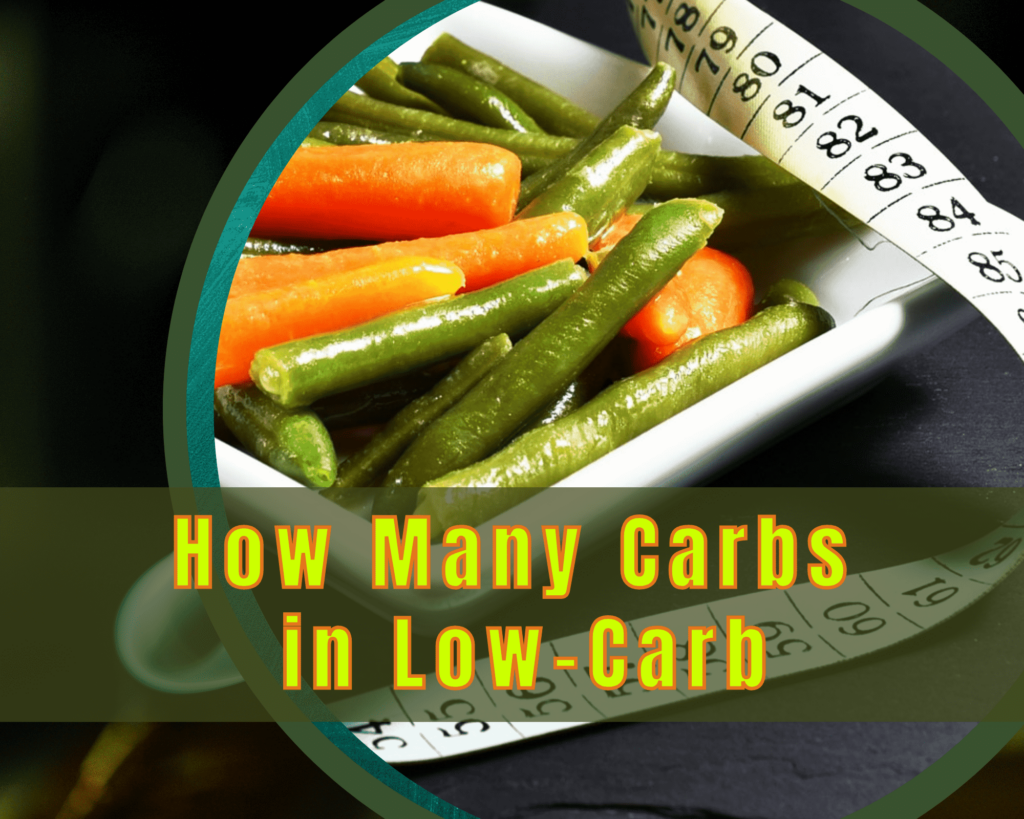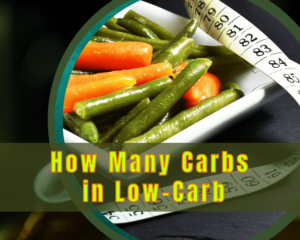
How Many Carbs in a Low-Carb Diet Is Ideal?

Disclosure: Please be aware that I may receive a small commission (at no extra cost to you) if you decide to make a purchase after clicking on a link in this article and making your purchase through one of my affiliate links.
This site does not provide financial or medical advice and is just for entertainment purposes. Before making any significant dietary changes, you should talk to your doctor.
Our affiliate disclosure is available in our privacy policy.
The question always comes up, how many carbs in a low-carb diet? What is a low-carb diet anyway? Are you ready to unlock the secrets of the low-carb lifestyle?
Picture this: you’re on a journey to optimal health and weight management, and you’ve decided to embrace the low-carb way of eating. But as you navigate through the aisles of your local grocery store, a burning question arises: How many carbs in a low-carb diet are ideal? The answer may not be as straightforward as you think. In this article, we’ll delve into the fascinating world of counting carbs on a reduced-carbohydrate diet and explore the intricate process of estimating the perfect carb intake for your individual needs.
Introduction: Understanding the low-carb diet
The low-carb diet is a way of eating that focuses on eating less carbs and more healthy fats and protein. This method is becoming more popular because it might help people lose weight, control their blood sugar better, get more energy, and be healthier overall.
Along with protein and fat, carbohydrates are one of the three main macronutrients that make up food. In large amounts, they can cause changes in blood sugar levels even though they give us energy. When you limit the amount of carbs you eat, your body has to use other fuel sources, like stored fat, to keep you going all day.
But it’s not always easy to agree on what a low amount of carbs really means. Based on age, gender, level of activity, and health conditions, people have different metabolic needs and can handle carbohydrates in different ways.
For this reason, it is very important to learn how to correctly count carbs in your own diet.
Why carbs are important for the body
The body needs carbohydrates to get energy for daily tasks and brain function. Cells in the body use glucose as fuel. Glucose is made when carbs are broken down. They also help your body digest food properly, keep your blood sugar levels in check, and keep your immune system strong.
However, not all carbohydrates are the same. Easy carbs and hard carbs are the two main types. Simple carbs are sugars that come from fruits, vegetables, and dairy products. They also include added sugars that are found in processed foods like candy and soda. These can cause a rapid rise in blood sugar because the body absorbs them so quickly.
The other type of carb is complex carb, which has a lot of fiber and takes longer to digest. Whole grains like quinoa and brown rice, legumes like lentils and beans, and starchy vegetables like sweet potatoes and corn all have them. Complex carbs give you more steady energy throughout the day because they digest slowly. They also don’t cause big changes in blood sugar levels.
Table of Contents
Defining low-carb for different goals
Low-carb diets can vary depending on individual health needs and goals. For those looking to lose weight or manage diabetes, a low-carb diet typically consists of consuming less than 130 grams of carbohydrates per day. This approach helps regulate blood sugar levels and encourages the body to use stored fat for energy rather than relying on glucose from carbohydrates.
On the other hand, athletes or individuals engaging in intense physical activity may follow a different interpretation of low-carb. These individuals may choose to consume slightly more carbohydrates to fuel their performance but still maintain a lower intake compared to the general population.
Some people opt for very low-carb or ketogenic diets, where carbohydrate intake is severely restricted (often below 50 grams per day). In these diets, the primary source of energy shifts from carbohydrates to fats. This metabolic shift leads to ketosis, a state where the body produces ketones that are used as an alternative energy source instead of glucose.
There is ongoing debate and varying opinions on the benefits and risks of low-carb or ketogenic diets, especially for athletes. While some research suggests that these diets can enhance endurance performance and promote fat burning, others argue that they may compromise high-intensity activities requiring quick bursts of energy.
For individuals engaging in intense physical activity, such as weightlifting or sprinting, carbohydrates are often considered the primary fuel source due to their quick availability. In low-carb or ketogenic diets, where carbohydrate intake is significantly restricted, athletes may experience reduced glycogen stores and potentially diminished performance during these types of activities.
However, proponents argue that with proper adaptation and careful planning, athletes can still perform well on low-carb or ketogenic diets. They assert that once a person becomes keto-adapted, meaning their body has successfully made the metabolic switch, they can efficiently utilize fats for energy even during intense exercise.
Another aspect to consider when it comes to athletic performance on low-carb diets is muscle growth and recovery.
Defining low-carb: Setting the threshold
What is considered low-carb can vary depending on individual goals and preferences. Generally, a low-carb diet can be defined as one where carbohydrate intake is limited to around 20-100 grams per day, or roughly 5-30% of total daily calorie intake.
It’s essential to note that different individuals may have different tolerances for carbohydrates based on factors such as activity level, body composition, metabolic rate, and overall health. Therefore, finding the ideal carbohydrate intake that works best for each person may require some experimentation.
For those who follow a moderate low-carb approach, the focus is often on consuming whole food sources of carbohydrates like vegetables, fruits in moderation, legumes, and whole grains while limiting refined sugars and processed foods high in carbs. This approach aims to provide an adequate amount of energy from healthy fats and protein while still allowing for a variety of nutrient-dense carb sources.
This moderate low-carb approach not only helps in maintaining a healthy weight but also promotes stable blood sugar levels and improves overall cardiovascular health. By including whole food sources of carbohydrates, individuals can ensure they are getting essential vitamins, minerals, and fiber along with their energy requirements.
One common misconception about following a low-carb diet is that it means completely eliminating all carbs from the diet. However, this is not the case. Carbohydrates are an important macronutrient needed for optimal body function. The key is to choose the right types and amounts of carbohydrates.
Vegetables should form the foundation of any low-carb eating plan. These provide essential nutrients while being relatively low in calories and carbs. Leafy greens such as spinach, kale, and Swiss chard are particularly nutrient-dense options to incorporate into meals.
Fruits can be consumed in moderation as part of a balanced, low-carb diet.
Individual factors: Personalized carb intake
Carbohydrate recommendations can vary based on an individual’s goals, activity level, and overall health. Factors such as age, sex, weight, metabolism rate, and any underlying medical conditions should also be considered when determining the right amount of carbohydrates to include in a low-carb eating plan.
For example, someone who is highly active or engages in intense exercise may require more carbohydrates for fueling their workouts and maintain their energy levels. On the other hand, individuals with certain health conditions, like diabetes or insulin resistance, may need to monitor their carbohydrate intake more closely.
It’s important to note that not all carbs are created equal. Choosing complex carbohydrates over simple ones can have a significant impact on blood sugar control and satiety. Complex carbs found in whole grains like brown rice, quinoa, and oats contain fiber that helps slow down digestion and keeps you feeling full for longer periods of time.
Another aspect to consider when planning a low-carb diet is portion sizes.
It’s essential to be mindful of portion sizes, as consuming large quantities of even low-carb foods can still contribute to weight gain. Additionally, incorporating healthy fats and proteins into meals can help balance blood sugar levels and provide a more well-rounded nutrient profile.

When following a low-carb diet, it’s beneficial to focus on whole, unprocessed foods rather than relying on processed low-carb products. These products often contain artificial ingredients and may not offer the same nutritional benefits as whole food sources. Instead, opt for lean sources of protein such as poultry, fish, tofu, or legumes alongside an assortment of colorful vegetables.
Snacking is another aspect that should be carefully considered when planning a low-carb diet. Choosing nutritious snacks like nuts or seeds can provide a satisfying crunch while also supplying essential vitamins and minerals. Avoiding high-sugar options like candy bars or sugary drinks is crucial for maintaining stable energy levels throughout the day.
Remember, staying properly hydrated is key in any dietary plan.
Health considerations: Impact on body and mind
A low-carb diet not only has physical health benefits but can also positively impact mental well-being. By reducing the intake of processed carbs and sugars, the body experiences more stable blood sugar levels, which in turn helps to regulate mood and energy levels.
Additionally, research suggests that a low-carb diet may have a positive effect on certain mental health conditions such as anxiety and depression. This is because consuming high amounts of carbohydrates can lead to fluctuations in blood sugar levels that can contribute to feelings of fatigue, irritability, and mood swings.
On the other hand, opting for nutrient-dense foods rich in protein and healthy fats can provide sustained energy throughout the day while promoting brain function. Omega-3 fatty acids found in fish like salmon or chia seeds are particularly beneficial for cognitive health and have been linked to improved memory and focus.
Furthermore, reducing carbohydrate intake may help stabilize hormones that play a role in regulating emotions.
In addition to stabilizing emotions, reducing carbohydrate intake can also support overall mental well-being. Studies have shown a link between high-carbohydrate diets and an increased risk of depression and anxiety. By prioritizing protein and healthy fats instead, individuals may experience improved mood and lower levels of stress.
Moreover, when it comes to brain health, it is important to consider the impact of refined carbohydrates. Foods like white bread, sugary snacks, and processed cereals can cause sharp spikes in blood sugar followed by crashes that leave us feeling mentally drained. In contrast, choosing complex carbs such as whole grains or fruits can provide a steady release of glucose into the bloodstream, maintaining consistent energy levels throughout the day.
To further enhance cognitive function, incorporating antioxidant-rich foods into one’s diet is crucial. Berries like blueberries and açai are packed with antioxidants that protect cells from oxidative stress and inflammation which may contribute to age-related cognitive decline.
Conclusion: Finding your ideal carb intake
Finding the right amount of carbohydrates and making mindful choices about the types of carbohydrates consumed can play a significant role in optimizing cognitive function and overall energy levels. By selecting complex carbs over refined ones, individuals can avoid the rollercoaster effect on blood sugar levels, ensuring a stable supply of glucose to the brain.
In addition to focusing on the right carbohydrates, incorporating antioxidant-rich foods is equally important. Antioxidants help fight off free radicals that can cause damage to brain cells, potentially leading to cognitive decline. Berries, with their vibrant hues and delicious flavors, are not only a delightful treat but also packed with these powerful antioxidants.
Blueberries have been widely studied for their positive effects on cognition. Research suggests that consuming blueberries regularly may improve memory and delay age-related declines in mental function. Furthermore, they have been linked to reducing inflammation in the brain and improving communication between brain cells.
Acai berries are another dietary superstar known for their high concentration of antioxidants.
Table of Contents


How Many Carbs in a Low-Carb Diet Is Ideal?

Jumpstart Your Journey: Starting a Low-Carb Diet 101

Keto and Intermittent Fasting Combo for Weight Loss

The Big Question About the Keto Diet for Weight Loss

How to Stay Low Carb During the Holidays

An Easy Low-Carb Meal Plan for Fat Loss

Mindful Eating: Key to Your Keto Diet During the Holidays

Your Ultimate Guide to the Best Keto Vegetables

What happens when you eat a low-carb high-fat diet?

How Many Carbs Are in a Low-Carb Diet? Let’s Take a Look.

Top Tips for Fast and Effective Weight Loss
Disclosure: Please be aware that I may receive a small commission (at no extra cost to you) if you decide to make a purchase after clicking on a link in this article and making your purchase through one of my affiliate links.
This site does not provide financial or medical advice and is just for entertainment purposes. Before making any significant dietary changes, you should talk to your doctor.
Our affiliate disclosure is available in our privacy policy.









